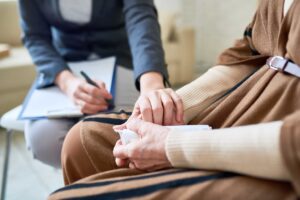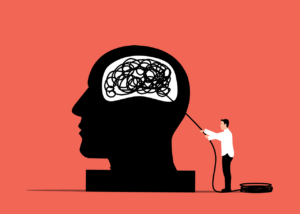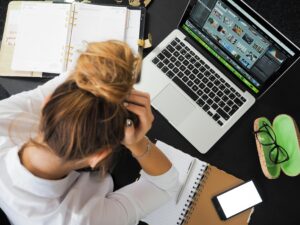Why do menopausal women suddenly develop fears/phobias?
Well let me explain:
Menopause is a highly significant biological transition in a woman’s life, which is marked by hormonal changes and thereby as a result affects various aspects of physical and emotional health.
It is characterised by a fluctuation and a decline in our hormone levels, mainly oestrogen and progesterone. These hormonal changes can impact the neurotransmitter activity in our brain, which then leads us to experience those pesky mood swings, anxiety, putting us into a heightened emotional state. All of these changes can contribute to the sudden onset of various fears/phobias which many of you may never have experienced before.
Menopausal symptoms such as hot flushes, night sweats, insomnia, and mood swings can cause significant stress and anxiety. Chronic stress and anxiety can exacerbate existing fears/phobias or trigger new ones to suddenly appear.
Because of these significant changes in a woman’s brain chemistry during this time of our life, the changes affect our brain and cognitive function. Some of you can experience forgetfulness, difficulty concentrating, or brain fog, which in turn, can increase those feelings of vulnerability and contribute to the development of fears/phobias.
Then to make matters worse, when menopause happens, more often than not it happens at the same time as other life changes doesn’t it? Changes such as children leaving home, career adjustments, a loss of identity and oneself, a sudden fear of the unknown, maybe even having to care for elderly parents, All these life events add stress and uncertainty, which can manifest in fears/phobias appearing.

Perhaps, if you’ve had traumatic experiences or negative associations in the past, these too can influence the onset of fears/phobias. For example, women who have experienced accidents, injuries, or other traumatic events may develop a fear of driving or specific situations associated with those experiences.
Menopause can also bring about concerns related to aging, such as changes in physical appearance, hair turning grey, the onset of little wrinkles around the eyes and elsewhere on the face, health issues, or mortality. These concerns can also trigger existential fears or contribute to the development of fears/phobias related to specific activities or situations.
Societal expectations and cultural attitudes toward aging and menopause can influence our perceptions of ourselves and our capabilities. Negative stereotypes or beliefs about aging can contribute to feelings of vulnerability or inadequacy, which may exacerbate fears/phobias.
While fears/phobias related to driving are not exclusive to menopausal women, there are several factors that may contribute to their development during this stage.
As I mentioned above:
- During menopause, there is a decrease in oestrogen levels, which can impact mood, cognition, and emotional regulation. Fluctuations in hormone levels can exacerbate anxiety or fear responses, potentially making you more prone to developing driving-related fears/phobias.
- Menopause is often associated with heightened anxiety and stress due to various physical symptoms such as hot flushes, insomnia, and mood swings. Anxiety disorders can manifest or worsen during this time, which lead to an increased fear of driving or specific driving situations such as motorway driving.
- Symptoms such as hot flushes, dizziness, fatigue, and joint pain can impact our ability to concentrate and react quickly whilst driving, particularly if it involves new or unfamiliar routes or responsibilities, potentially leading to fear or an avoidance of driving altogether.
- Menopause can bring about changes in perception, cognition, and memory. Some of us may experience difficulties in spatial awareness, depth perception, or reaction time, which can contribute to driving-related fears/phobias.
- Also if in the past you happened to have had a nasty experience whilst driving, maybe even an accident or a near miss, this could very well lead to driving-related fears/phobias during the menopause, especially if we suddenly become more acutely aware of our mortality or physical vulnerability.
- Additionally, practicing relaxation techniques, gradual exposure to driving situations, can help alleviate driving-related anxieties and improve our overall well-being during menopause.
One of the best treatment therapies for menopausal women experiencing sudden onset of fears/phobias for several reasons including driving is Clinical Hypnosis, combined with NLP, Mindfulness, Coaching and Bilateral Stimulation/EMDR, because:
Hypnosis induces a deeply relaxed state, which helps to reduce stress and anxiety levels commonly experienced during menopause.
With relaxation, hypnotherapy can alleviate the physiological symptoms associated with fear and anxiety, by accessing the subconscious mind, where deep-seated beliefs, emotions, and memories are stored. Menopausal fears/phobias can be rooted in past experiences, traumas, or unresolved conflicts. Hypnotherapy can uncover and address these underlying factors, facilitating emotional healing and resolution.
These modalities help reframe negative thought patterns and beliefs which contribute to fears/phobias. Through suggestion and visualisation techniques, they promote a reframed way of thinking about menopausal symptoms, aging, and related fears, creating a more positive outlook and greater self-efficacy. By pairing relaxation techniques with hypnotherapy and the other modalities mentioned above they will help you learn to manage and overcome fears in a safe and controlled space.
Hypnosis can provide a platform for practicing new coping strategies and behaviours in a hypnotic state, where the subconscious mind is more receptive to suggestion. The menopausal you can rehearse calm and confident responses to fear-inducing situations, reinforcing positive behaviours and building self-confidence.
This in turn, will empower you to regain a sense of control over your thoughts, emotions, and reactions. By learning self-hypnosis techniques, you can learn to self-regulate your stress levels and manage your fear and anxiety symptoms independently, enhancing your overall sense of well-being and resilience.
Best of all, these modalities holistically address your menopausal fears/phobias considering the interconnectedness of mind, body, and emotions. By promoting relaxation, psychological insight, and behavioural change, you will have the tools at your disposal to navigate the complex challenges of menopause with greater ease and confidence.
It’s really important for those of you who are experiencing any fears/phobias, anxiety and the such like, including fear of driving to seek help from healthcare professionals, such as a Hypnotherapist, Life Coach, Nutritionist, as well as an expert who can advise you on the correct type of exercise specifically designed for you, because these people will provide you with strategies for managing anxiety and addressing specific fears.
These modalities are used as part of a comprehensive treatment plan, tailored made for your individual needs, including in many cases lifestyle modifications.





